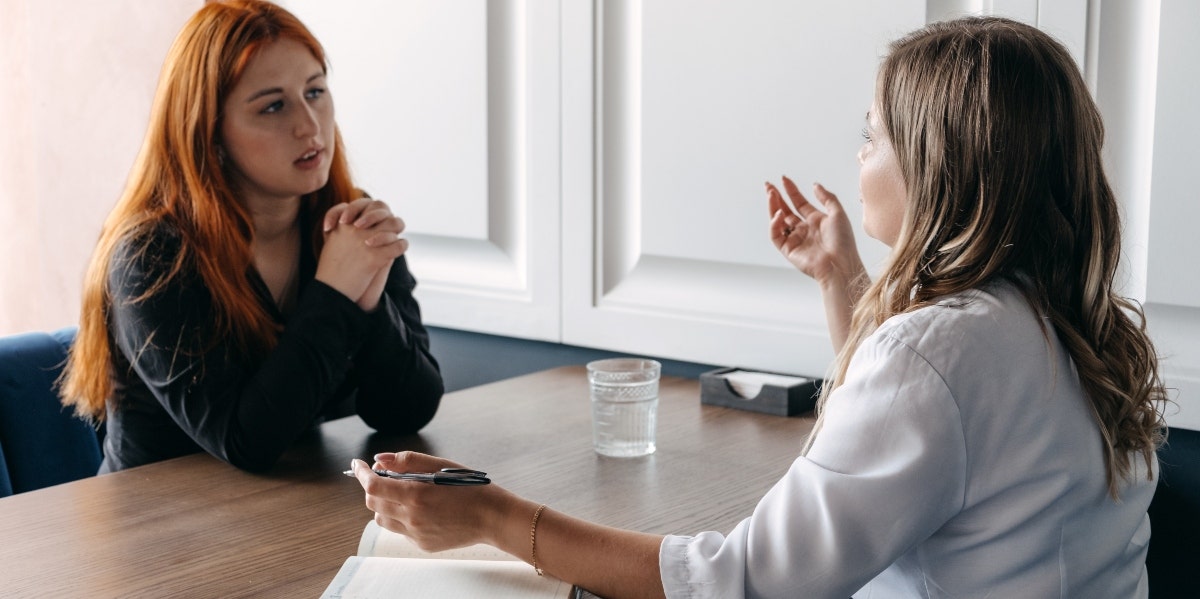7 Helpful Tips To Help You Open Up In Therapy — Even When You're Scared
It can be a game-changer.
 Iryna Imago/Shutterstock
Iryna Imago/Shutterstock Going to therapy is a big step. But, talking to a therapist isn't always so easy.
If you consider yourself a private person or don’t like talking about yourself, opening up and talking in therapy can be hard.
Regardless of whether you’re brand new or have been going to therapy sessions for a long time, you may feel overwhelmed at the possibility of sharing your pain, negative thoughts, and deepest secrets with a stranger.
This is perfectly normal and many people find themselves in the same position. But, the benefits of therapy are many, and, in the end, definitely worth it.
If you’re having a hard time talking to a therapist, try this.
1. Give it time.
Any relationship takes time to develop trust and build rapport. The same goes for your relationship with your therapist.
Although it may be difficult to imagine right now, you’ll feel more comfortable talking in therapy over time and your sessions will continue to get easier.
But, if you're not sure if your therapist is a good fit, time may not be beneficial. Only you know whether or not you can imagine yourself opening up to them in the long term.
It’s your treatment, so be patient throughout the process, but definitely make sure it's helping.
2. Write it down.
What do you talk about in therapy? If you find it easier to express your thoughts on paper rather than in person, consider writing down how you feel before a session.
Whether you decide to use a scrap piece of paper or keep a therapy journal is up to you, it could include a list of topics you’d like to discuss, thoughts you’ve had throughout the week, or situations in your life you’d like to process.
Expressing your feelings by writing them out is a great way to feel safer in therapy and help you engage with your therapist as your treatment progresses.
If the thought of watching someone read what you wrote makes you uncomfortable, consider sending it in an e-mail before your session.
3. Let the therapist guide you.
Therapists are trained for these situations!
Their main job is to act as a guide in your recovery and healing process, so they know how to talk to their clients.
Rather than thinking of therapy as a monologue, think of it as a conversation.
Let your therapist lead you in the right direction.
4. Prepare for each session.
It may sound like a lot of work, but then again therapy isn’t supposed to be easy.
It can require effort to get the most out of it.
Preparing for sessions will give you time to consider what you’d like to discuss.
If you put it off or wait until the last minute, you may be unwittingly making it tougher to open up.
5. Think about the therapeutic relationship.
Your therapist is non-judgmental — they won’t insult or scold you.
It’s such a rare and unique relationship and isn’t accessible in our regular circles, and it’s one of the strongest avenues for successful treatment.
If you’ve been concerned about opening up with your therapist, tell them!
Any good therapist will be happy to work through this with you. This particular obstacle can even serve as practice for addressing issues in your personal relationships.
You may be stunned at how understanding your anxiety about therapy makes it more natural to open up.
6. Start small.
Since therapy asks you to be vulnerable, you may find it easier to start with topics that aren’t as heavy.
Your therapist expects to be tested with your trust to a certain extent, so you have every right to judge their reaction to the smaller topics before exposing the more substantial ones.
It’s OK to take your time and get comfortable with your therapist.
Over time, your relationship will strengthen.
7. Practice, practice, practice.
It’s not a straightforward process. Keeping to yourself may be one coping skill you’ve developed over time to guard yourself from judgment.
Verbalizing your thoughts with your therapist gets easier.
If you get into the habit of freeing your expression around safe and trustworthy people, you might be surprised at the results.
You may end up feeling more confident, emotionally strong, and in greater control of your life and relationships.
Whether you're doing in-person or online therapy, it's up to you to take the first step in opening up and talking to a therapist.
Your therapist is a stranger only as long as you keep them that way.
If you’re going through a tough time in your life, being vulnerable with anyone might seem like the last thing you want to do. But, establishing a relationship with them can be incredibly valuable.
By taking a few steps to make the most of the time you have with your therapist, you’ll already be doing everything you need to do for your mental health.
Dr. Leda Kaveh is a licensed clinical psychologist and the owner/director of Washington Psychological Wellness. If you want to learn more about family therapy, contact them today!

